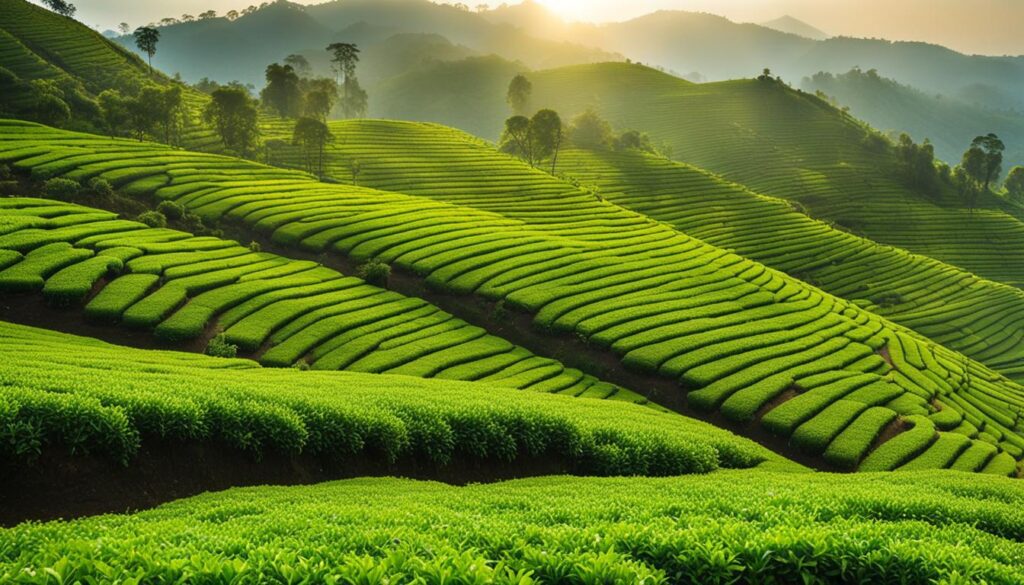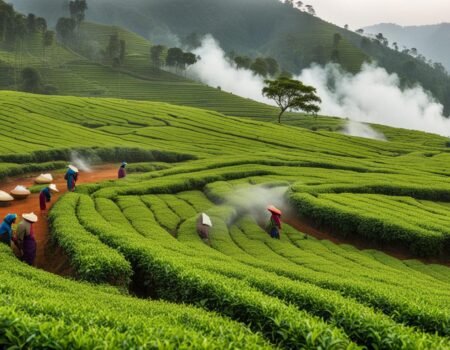
The Rise of Organic Tea Production in Global Regions
We’re witnessing an exciting trend in the tea industry – the rise of organic tea production in global regions. As consumers become more conscious of their health and the impact of their choices on the environment, the demand for organic tea is on the rise. Let’s explore the remarkable growth, health benefits, sustainable cultivation practices, market trends, global regions, and challenges in organic tea production.
Organic tea offers a healthier and environmentally friendly alternative to conventional tea production. The global organic tea market was valued at USD 820.8 million in 2019 and is projected to reach USD 1,918.7 million by 2027, growing at a CAGR of 11.2%. The increasing demand for organic products and the perception that clean-label products are safer and healthier are driving this growth.
Key Takeaways:
- Organic tea production is experiencing significant growth due to increasing consumer demand for organic and sustainable products.
- The global organic tea market is projected to reach USD 1,918.7 million by 2027.
- Organic teas contain higher levels of catechins and antioxidants, promoting overall health and well-being.
- Organic tea cultivation follows sustainable farming practices that prioritize environmental preservation and biodiversity conservation.
- The organic tea market is witnessing trends such as the surging consumer preference for buying organic commodities and a growing demand for specialty teas.
Health Benefits of Organic Teas
Organic teas have gained popularity not only for their exquisite flavors but also for their numerous health benefits. These premium organic tea selections are packed with natural compounds that promote overall well-being and contribute to a healthier lifestyle.
One of the key advantages of organic teas is their higher concentration of catechins and antioxidants compared to conventional teas. These powerful substances help to protect the body against free radicals, reducing the risk of chronic diseases and supporting the immune system.
Moreover, organic teas are known for their positive effects on weight management. Certain varieties, such as green tea, have been shown to boost metabolism and promote fat oxidation, making them a favorable choice for those looking to shed some pounds.
Organic teas offer a holistic approach to health, providing benefits ranging from detoxification to anti-aging properties. Their natural composition and absence of chemical additives make them a popular choice for health-conscious consumers.
As the demand for organic products continues to increase, consumers are becoming more aware of the health benefits associated with organic teas. This has led to a growing market for premium organic tea selections, with tea enthusiasts seeking out unique blends and flavors that not only taste great but also contribute to their well-being.
The Health Benefits of Organic Teas:
- Higher concentration of catechins and antioxidants
- Boosts the immune system
- Aids in weight management and fat oxidation
- Supports detoxification
- Possesses anti-aging properties
Sustainable Organic Tea Cultivation
When it comes to organic tea cultivation, sustainability is the key. Organic tea farmers follow eco-friendly farming practices that prioritize environmental preservation and biodiversity conservation. By eliminating the use of chemical fertilizers and pesticides, they ensure that their tea is grown in a way that is healthier for both consumers and the planet.
One of the main principles of sustainable organic tea farming is the focus on long-term soil health. Organic tea farmers use techniques such as composting, crop rotation, and natural pest control to maintain the fertility of the soil. This not only ensures the quality of the tea but also helps to preserve the surrounding ecosystems by avoiding soil degradation and water pollution.
Additionally, sustainable organic tea cultivation promotes water conservation. Through practices like watershed management and water recycling, organic tea farmers minimize water usage and reduce their impact on local water resources. This not only helps to protect the environment but also ensures a reliable water supply for future tea production.
Benefits of Sustainable Organic Tea Cultivation
The benefits of sustainable organic tea cultivation go beyond environmental preservation. By choosing organic tea, consumers can support the well-being of tea farmers and their communities. Organic farming practices provide fairer working conditions and better livelihoods for farmers, ensuring that they receive fair wages and are not exposed to harmful chemicals during tea cultivation.
Organic tea farming practices prioritize environmental preservation and biodiversity conservation, ensuring the long-term health of the soil, water, and surrounding ecosystems.
In conclusion, sustainable organic tea cultivation is not only good for the environment but also offers a healthier and more ethical choice for consumers. By opting for organic tea, we can enjoy a delicious cup of tea while knowing that it has been produced in a way that respects both nature and the people involved in its production.

Organic Tea Market Trends
The organic tea market is witnessing several trends that are shaping the industry and influencing consumer preferences. As the demand for organic products continues to grow, organic tea is gaining popularity among health-conscious consumers. The market is experiencing a surge in consumer preference for buying organic commodities, driven by the perception that organic products are safer, healthier, and more environmentally friendly.
One of the notable trends in the organic tea market is the increasing demand for specialty teas. Consumers are seeking unique flavors and high-quality blends, which has led to the emergence of a wide variety of organic green tea options. Green tea, in particular, is known for its numerous health benefits and is favored by those looking for a natural and clean-label beverage.
Sri Lankan organic tea brands are making a strong presence in the market. With their unique flavors and commitment to organic farming practices, these brands offer a distinct experience to tea enthusiasts. Sri Lanka’s lush tea plantations produce some of the finest organic teas, and their products are highly sought after by tea connoisseurs around the world.
Consumer demand for organic tea is driven by a growing awareness of the health benefits and the desire to make more environmentally conscious choices.
The Growing Popularity of Organic Green Tea Varieties
Organic green tea varieties have gained significant popularity in recent years due to their numerous health benefits and unique flavor profiles. Green tea is rich in antioxidants and catechins, which are known for their potential to boost the immune system, aid in weight management, and promote overall well-being.
The organic green tea market offers a wide range of options, including traditional Japanese matcha, sencha, and genmaicha. These teas are known for their distinct flavors and are often enjoyed as a refreshing and healthy beverage.
In addition to the health benefits, organic green tea production also aligns with sustainable farming practices, making it an appealing choice for environmentally conscious consumers. By choosing organic green teas, consumers can enjoy a flavorful and health-enhancing beverage while supporting eco-friendly agricultural practices.
Sri Lankan Organic Tea Brands: A Unique Flavor Experience
Sri Lanka has emerged as a leading producer of organic teas, offering a diverse range of flavors and blends. From the highlands of Nuwara Eliya to the picturesque plantations in Kandy, Sri Lanka’s organic tea brands are known for their commitment to sustainable agriculture and their dedication to producing the finest quality teas.
Each cup of Sri Lankan organic tea offers a unique flavor experience, reflecting the terroir of the region and the expertise of the tea makers. Whether it’s the delicate aroma of Ceylon black tea or the subtle notes of Earl Grey, Sri Lankan organic teas delight the senses and provide a truly enriching tea-drinking experience.
The rise of organic tea market trends, including the growing demand for specialty teas and the emergence of Sri Lankan organic tea brands, is reshaping the industry and providing consumers with a wider selection of flavorful and sustainable tea options. As more people embrace the benefits of organic teas, the market is expected to continue its upward trajectory, catering to the evolving tastes and preferences of tea enthusiasts.
Global Regions and Organic Tea Production
When it comes to organic tea production, certain global regions have emerged as leaders in cultivating the finest and most sought-after teas. China, India, and Japan stand out as the largest producers of organic tea in terms of volume, each offering unique flavors and characteristics.

China, renowned for its rich tea heritage, is widely recognized for producing some of the best organic teas in the world. The country’s long-standing tradition, meticulous cultivation techniques, and favorable climate create the perfect conditions for tea plants to thrive. Chinese organic teas are known for their exceptional taste, aroma, and health benefits.
Meanwhile, India has gained recognition for its impressive array of certified organic teas. With a diverse range of tea-growing regions spread across the country, Indian teas are celebrated for their distinct flavors and high quality. From the renowned Darjeeling tea to the robust Assam and Nilgiri teas, India offers a variety of options for tea enthusiasts seeking certified organic teas.
While China and India dominate the organic tea production scene, other global regions are also making their mark. African countries, for example, have verdant tea plantations that contribute significantly to the global organic tea production. These regions bring their unique flavors and profiles to the ever-growing organic tea market.
Table: Top Organic Tea Producing Regions
| Region | Country | Highlights |
|---|---|---|
| Asia | China | Known for producing the best organic teas |
| Asia | India | Renowned for certified organic teas |
| Africa | Variety of countries | Contributing to global organic tea production |
Challenges in Organic Tea Production
Organic tea production faces a set of unique challenges in meeting the growing demand for organic and sustainable products. One of the primary constraints in organic tea production is the lack of knowledge among tea growers regarding organic farming practices. Many tea farmers are accustomed to conventional methods and are not familiar with the intricacies of organic cultivation. This knowledge gap can hinder the transition to organic farming and limit the availability of organic tea in the market.
Another significant challenge is the higher production cost associated with organic tea. Organic farming practices require farmers to abstain from using chemical fertilizers and pesticides, leading to increased labor and management costs. Additionally, the certification process for organic tea is expensive, as it involves inspections, documentation, and compliance with stringent standards. These higher production costs can make organic tea less financially viable for tea growers, especially in regions where conventional tea production is already well-established.
However, despite these challenges, efforts are being made by governments and organizations to address these constraints and promote organic tea production. Various training programs and workshops have been organized to educate tea farmers about the benefits and techniques of organic farming. Incentives and subsidies are also provided to help offset the higher production costs associated with organic cultivation. By raising awareness and providing support, these initiatives aim to encourage tea growers to adopt sustainable organic farming practices and expand the availability of organic tea in the market.
The Importance of Overcoming Challenges
Overcoming the challenges in organic tea production is crucial for the sustainable growth of the organic tea market. With increasing consumer demand for organic and sustainable products, it is essential to ensure a stable and reliable supply of high-quality organic tea. By addressing the constraints such as lack of knowledge and production costs, we can create a more favorable environment for tea farmers to embrace organic cultivation. This will not only benefit the farmers economically but also contribute to the preservation of the environment and the health and well-being of consumers.
Furthermore, the organic tea sector has a vital role to play in promoting sustainable agriculture practices. By relying on natural methods and avoiding the use of harmful chemicals, organic tea farming helps protect the soil, water sources, and biodiversity. It also supports the livelihoods of farmers and promotes social and economic development in tea-growing regions. Overcoming the challenges in organic tea production is, therefore, a collective responsibility of stakeholders in the industry to ensure the long-term viability and growth of organic tea.
The Future of Organic Tea Production
As the demand for organic and sustainable products continues to rise, there is a bright future ahead for organic tea production. By addressing the challenges and supporting tea growers in adopting organic farming practices, we can create a more robust and resilient organic tea market. This will not only benefit consumers seeking healthier and environmentally friendly options but also contribute to the overall sustainability of the tea industry. With concerted efforts and collaboration, we can establish a thriving ecosystem for organic tea production, promoting the well-being of individuals and the planet.
Conclusion
In conclusion, the global organic tea market is thriving as more consumers seek out organic and sustainable options. With a growing demand for healthier and environmentally friendly products, organic tea production is on the rise. By following sustainable farming practices, organic tea growers prioritize the long-term health of the soil, water, and surrounding ecosystems.
The market trends also reflect this shift towards organic teas, with a surge in consumer preference for buying organic commodities and a growing demand for specialty teas. Organic green tea varieties, known for their health benefits, are becoming increasingly popular among health-conscious individuals. Additionally, Sri Lankan organic tea brands are making waves with their unique flavors and exceptional quality.
Although organic tea production faces challenges, such as a lack of knowledge among tea growers and higher production costs, efforts by governments and organizations to raise awareness and provide support are helping overcome these obstacles. As consumers become more conscious of their health and the impact of their choices on the environment, the organic tea market is expected to continue its upward trajectory.
At [Company Name], we understand the importance of sustainable farming practices and are committed to promoting organic teas. We invite you to explore our wide range of organic tea selections and join us in supporting the growing consumer demand for organic and environmentally friendly products.
FAQ
What is the value of the global organic tea market?
The global organic tea market was valued at USD 820.8 million in 2019 and is projected to reach USD 1,918.7 million by 2027, growing at a CAGR of 11.2%.
What is driving the growth of the organic tea market?
The increasing demand for organic products and the perception that clean-label products are safer and healthier are driving the growth of the organic tea market.
How has the COVID-19 pandemic impacted tea production?
The COVID-19 pandemic has impacted tea production in countries like India and China, but the increase in at-home consumption has boosted retail sales of tea bags.
What are the health benefits of organic teas?
Organic teas contain higher levels of catechins and antioxidants compared to conventional teas. They promote overall health and well-being, boost the immune system, aid in weight management, detoxification, and have anti-aging properties.
How is organic tea cultivation different from conventional tea cultivation?
Organic tea cultivation follows sustainable farming practices that eliminate the use of chemical fertilizers and pesticides. The production methods prioritize environmental preservation and biodiversity conservation.
What trends are observed in the organic tea market?
The organic tea market is witnessing trends such as the surging consumer preference for buying organic commodities, the emergence of natural and clean-label healthy beverages, and a growing demand for specialty teas.
Which regions are the largest producers of organic tea?
Asia, particularly China, India, and Japan, is the largest producer of organic tea in terms of volume. China is known for producing the best organic teas, while India is renowned for its certified organic teas.
What challenges does organic tea production face?
Organic tea production faces challenges such as a lack of knowledge among tea growers regarding organic farming practices and the higher production costs compared to conventional tea. The certification process for organic tea is expensive and can deter farmers from adopting organic farming.
How is the global organic tea market expected to grow?
The global organic tea market is experiencing significant growth due to increasing consumer demand for organic and sustainable products. As consumers become more conscious of their health and the impact of their choices on the environment, the demand for organic tea is expected to continue to rise.






